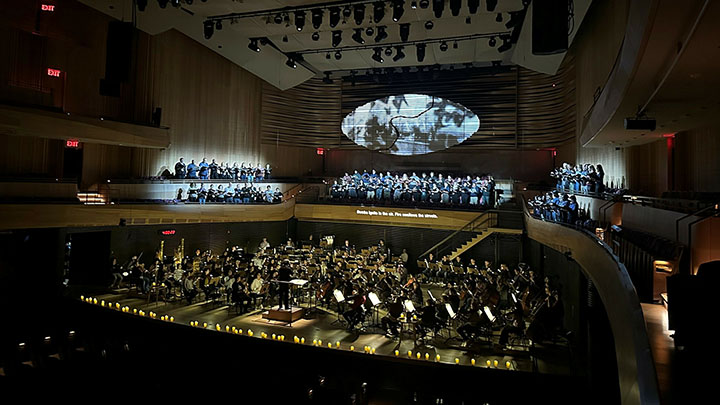
The story of how tens of thousands of European Jews ended up in China in the runup to World War II is, I’m sure, fascinating and underreported. There are no doubt thousands of stories from that era worthy of the attention of eminent composers and writers. The diverse cultural stew of this period could also potentially make for some truly spectacular new music. Émigré, unfortunately, fails to do justice, either musically or theatrically, to this group of refugees or to the Shanghainese who took them in.
In his essay “De Profundis,” Oscar Wilde describes a sentimentalist as “one who wants to have the luxury of an emotion without paying for it.” I’ve always taken this to mean that what makes our feelings fine and noble is that we must sacrifice for them. Expressions of pathos are callow and thin if they are not somehow personally experienced. Émigré, which paradoxically manages to be both flavorless and saccharine, seems like a good example of what Wilde was getting at. It expresses sorrow the way a human resource officer expresses empathy. Zigman’s romcom soundtrack, set to Campbell’s juvenile rhyming couplets, doesn’t even try to tempt us into caring about the story, the music, or even the original victims of long-ago war crimes.
Émigré is partially staged (by Mary Birnbaum), with singers in costume dramatizing the story in the choral loft and downstage. The musicianship, if not the actual music, of the performance was elegant and largely without flaw. Bass-baritone Shenyang, as the stern father and Shanghainese herbalist Wei, was especially impressive. Likewise, mezzo-soprano Huiling Zhu, performing as Wei’s daughter, Li, brought real passion to an uninspiring score. The cast of singers tried their darndest to spin straw into gold, but not even masterful vocal precision could perform that magic. It seemed like the composer’s intention was for the music to be instantly forgettable. It had a fill-in -the-blank quality where it was easy to predict when the strings would swell or when the tragic events of the story would have the philharmonic slip into a minor key. Rarely have I experienced such refined artistry dedicated to such desultory musical homework.
Given the relationship the New York Philharmonic has with China currently, the oratorio seems to have had some kind of diplomatic mission. Much ink was spilled around the show’s December premier in Shanghai about bridging the cultural gap between the US and China. However, composer Zigman, better known for writing music for films like “The Notebook,” assured The New York Times, “I don’t think music and politics really belong in the same sentence…I just want people to be human and kind, and there are certain parts of this piece that help that vision.” This nicely sums up the insipidity of the work. It strikes me that a composer who’s written an apolitical holocaust oratorio that attempts to bridge the cultural divide by feeding its audience heaping spoonfuls of pap is probably better off in Hollywood.
Émigré premiered the same week as Turandot at the Met, while flyers for Shen Yun Performing Arts, which will have a residency at the David H. Koch Theater in April, were being distributed around Lincoln Center. Western views on China on display at Lincoln Center this spring range from Puccini’s smorgasbord of orientalism, to the mysteriously well-funded anticommunist circus, to Zigman’s nondescript diplomatic oratorio. Somehow Puccini’s old school opera, chock full of racial stereotypes, manages to be the least insane of the three.
Photos: Adam Crane/Courtesy of the New York Philharmonic


